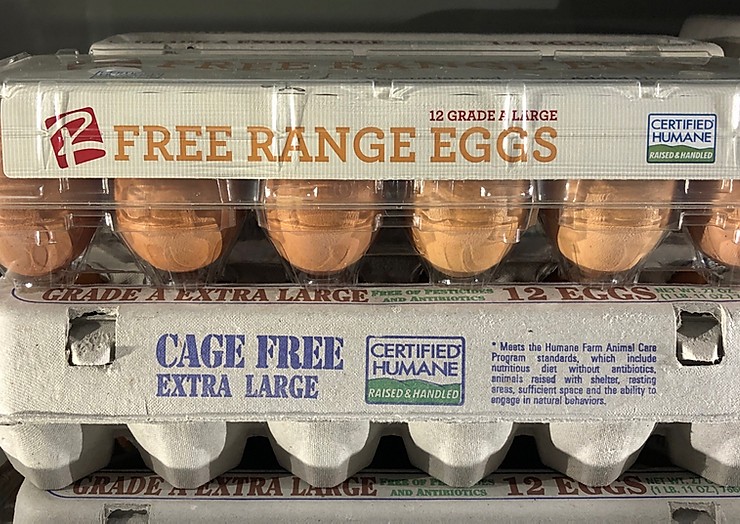Try our new free GreenChoice - Food Scanner mobile app!
DOWNLOAD-
-
-
Diets
Allergies
Take our 30-second quiz & we’ll filter our site to show only products that match your dietary preferences.
- GCNow
- Know Your Label: Certified Humane

We will be continuing our Know Your Label series by discussing the Certified Humane Raised & Handled animal welfare certification – breaking down the components, standards, and tiers of Certified Humane!
For starters, Certified Humane® Raised and Handled® is a certification placed on meat, chicken, pork, eggs, pet food, or other dairy products. Its purpose is to display which farm foods are following the Humane Farm Animal Care’s (HFAC) guidelines and standards.
About Humane Farm Animal Care (HFAC)
Humane Farm Animal Care (HFAC) is a non-profit certification organization with a mission to improve the standards of animal welfare from birth through harvesting.
HFAC makes their standards transparent and available to the public so that each consumer can make a conscious decision in their grocery purchases and play a part in animal welfare.

What is Certified Humane Raised & Handled?
Surprisingly, the Certified Humane certification looks the same on every product yet the standards for certification vary based on the product and its claims.
For example, you will see that “cage-free” eggs, “free-range” eggs, and “pasture-raised” eggs all have the same Certified Humane certification yet they all must meet very different standards.
It can be difficult to remember the difference between the standards of each Certified Humane egg product.
Breakdown of Certified Humane Standards
Here we breakdown the Humane Certified Raised & Handled standards for eggs.
“Cage-free” eggs
These hens must have at least 1.5 square feet of space per hen. Here, the birds are not required to have access to outdoor space. They must have 8 hours of light and 6 hours of continuous darkness during a 24-hour cycle.
“Free-range” eggs
If outdoor access is a must for you, you may want to consider free-range eggs. The hen must have at least 2 square feet per bird with access to the outdoors for a minimum of 6 hours.
“Pasture-raised” eggs
If you are a consumer who is looking for the highest quality of animal welfare, with the most extensive certification standards, you should purchase pasture-raised eggs. Their standards include at least 108 square feet per bird. Also, the birds must be outside all year with easy access to mobile and fixed housing.
When shopping for Certified Humane egg products:
First look for the certification on the packaging (as seen below).
Second, pay attention to what claim the packaging has stated: “cage free”, “free-range”, or “pasture raised”.

See Certified Humane Cattle Animal Welfare Standards.
See Certified Humane Pig Animal Welfare Standards.
Animal Welfare standards for each animal covered by Certified Humane Raised & Handled.
Certified Humane Raised & Handled standards for all animal species
- All animals must not be confined to cages, crates, or tie stalls. This means that Certified Humane products come from farms that allow their animals to live a natural life.
- Certified Humane products reduce the stress of animals through gentle handling and by providing enough shelter.
- According to the ASPCA, Certified Humane food bans hormones along with sub-therapeutic antibiotics.
- All animals are to be fed a nutritious, healthy diet that is free of animal by-products and added antibiotics or hormones. They must have access to a sufficient amount of clean, pure water.
Cost of Certified Humane Raised & Handled Certification

When applying for the initial application or renewal, farmers must pay HFAC a $75 application fee.
Farmers receive feedback and support from HFAC through their inspections which costs $600 per day per inspector, however, there is an option to split the fee with other nearby farmers.
HFAC also offers inspections during the production process which costs $700 per day per inspector. Furthermore, Certification fees vary based on the number of animals and products produced and sold from those animals.
Limitations to the Certified Humane Raised & Handled Certification
- Beak trimming. Although Certified Humane standards forbid debeaking, it still allows the process of beak trimming. The purpose of the beak trimming is to prevent pecking and cannibalism.
- Outdoor access. Certified Humane “cage-free” birds are not required to have outdoor access.
- Humane euthanasia. HFAC follows the American Veterinary Medical Association’s methods of euthanasia. When the animal is in a state of suffering, HFAC permits methods of euthanizing the species.
All in all, although there are some misconceptions of what the Certified Humane certification really indicates, it does provide meaningful insight into the overall treatment of animals and farm facilities.
***
It can be difficult to follow and compare all the components of the many animal welfare certifications out there, so stay tuned for GreenChoice’s Animal Welfare system coming soon! In the meantime, GreenChoice offers you product-specific health & sustainability insights and scores for over 55,000 food and beverage products, so you can easily compare products for food safety, processing concerns, nutritional value, and environmental impact. Download the app now for free on iPhone and Android and find foods fitting your dietary needs, values, and budget!